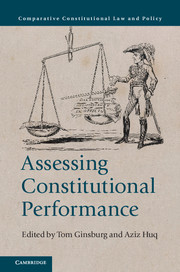Book contents
- Frontmatter
- Contents
- List of figures
- List of tables
- List of contributors
- Acknowledgments
- INTRODUCTION
- PART I DEFINING CONSTITUTIONAL PERFORMANCE
- PART II MANAGING SPECIFIC CONSTITUTIONAL CHALLENGES
- 6 Constitutional performance in transitions from military to civilian rule
- 7 Constitutional permissiveness, constitutional restrictiveness, and religious freedom
- 8 Performance of constitutions: Transitional provisions
- 9 Time and constitutional efficacy
- 10 Competitive democracy and the constitutional minimum core
- PART III CASE STUDIES
- Index
- References
8 - Performance of constitutions: Transitional provisions
from PART II - MANAGING SPECIFIC CONSTITUTIONAL CHALLENGES
Published online by Cambridge University Press: 05 August 2016
- Frontmatter
- Contents
- List of figures
- List of tables
- List of contributors
- Acknowledgments
- INTRODUCTION
- PART I DEFINING CONSTITUTIONAL PERFORMANCE
- PART II MANAGING SPECIFIC CONSTITUTIONAL CHALLENGES
- 6 Constitutional performance in transitions from military to civilian rule
- 7 Constitutional permissiveness, constitutional restrictiveness, and religious freedom
- 8 Performance of constitutions: Transitional provisions
- 9 Time and constitutional efficacy
- 10 Competitive democracy and the constitutional minimum core
- PART III CASE STUDIES
- Index
- References
Summary
As detailed throughout this volume, assessing the performance of a constitution is a complex and subjective task, and perhaps even an impossible one. Problems include determining the objectives against which performance is to be measured, what can be positively and negatively attributed to the constitution, and what the counter-factual in any given case might be. We focus here on one aspect of constitutional implementation which is crucial to nearly all constitutional stories, and an issue which we often observe as a key practical challenge which does not receive the attention it deserves – that of constitutional transitional provisions (“transitional provisions”).
Transitional provisions provide a series of directions through which the new constitutional regime is established, and the old order is phased out. During this state of “interregnum” between one constitutional order (or in some cases, a lack thereof) and the new order, transitional provisions must cover a series of issues including, inter alia, the establishment of new institutions and reform of continuing institutions; continuity of law and the status of the current law on the books, transitional justice processes and the timing and procedures for the first elections.
The argument that more attention should be paid to the performance of transitional provisions is threefold. Firstly, as mentioned by Ginsburg and Huq in the introductory chapter, transitional provisions provide a “threshold bundle of steps” set forth by a constitution in the process of institutional development. As they rightly observe, these steps are generally methodologically simple to measure, and cannot only reveal how well implementation is progressing, but might also reveal where blockages might lie, and afford an opportunity to address such obstacles.
Secondly, without the establishment of the fundamental building blocks of the new constitutional order, the performance of the constitution in terms of fulfilling its own goals and objectives is immediately subject to question. Cracks in the foundations will more often than not lead to significant challenges in constructing the new house.
- Type
- Chapter
- Information
- Assessing Constitutional Performance , pp. 203 - 232Publisher: Cambridge University PressPrint publication year: 2016
References
- 1
- Cited by



